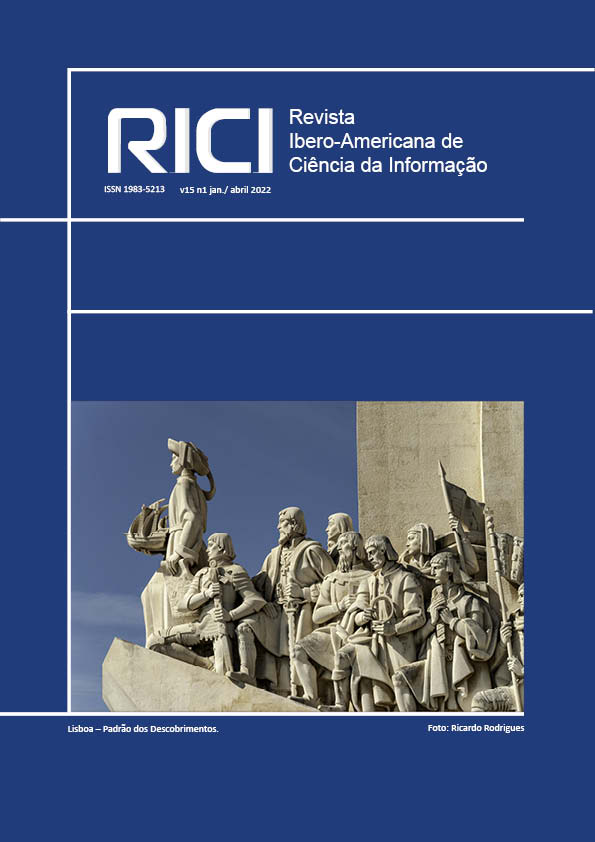Information skills in pandemic times
DOI:
https://doi.org/10.26512/rici.v15.n1.2022.42454Keywords:
Information literacy, Media literacy, Pandemic, Information skillsAbstract
In the current global context, characterized by the Covid-19 pandemic, the circulation of information about this topic has become one more problem to be addressed. The quick distribution of messages of dubious origin and often manipulated for intentional purposes has put the whole population in a vulnerable situation with respect to the access to quality information on the pandemic. It is not new from information literacy, the treatment of information competencies that allow people to be in a better position to access, evaluate and select the information they need, even in relation to issues related to health. At the same time, , useful elements can be taken to address the problem in question from the perspective of media literacy . This relation between information literacy and media literacy has been reflected in recent working documents generated by Unesco, through its work line Media & Information Literacy - Informational and media literacy where both concepts are addressed from their particularities, but it is detected the need to treat them together in a single global concept. The objective of this work is to research, based on the existing bibliographic production, the main information and media competencies that have been reconfigured from a global pandemic context. As the main results, it is expected to show the existence of sufficient material to think about a revaluation of the mentioned competences and the corresponding proposal of alternatives for their reflection in information and media literacy programs.
Downloads
References
CAÑÓN, Avilés. Pamela; BECERRA, Civilo. Maureen. Alfabetización informacional y el rol del bibliotecario transformativo para enfrentar la desinformación en tiempos de crisis. Serie Bibliotecología y Gestión de Información, n. 112, p. 1-17, 2020. Disponível em: http://eprints.rclis.org/40306/
BENAVENT, Aleixandre et al. Información y comunicación durante los primeros meses de Covid-19: Infodemia, desinformación y papel de los profesionales de la información. Profesional de la información, v. 29, n. 4, 2020. Disponível em: http://eprints.rclis.org/40334/
BLANCO, Nancy. Bibliotecas, libros y lecturas a través del COVID-19. Información, cultura y sociedad, v. 43, p. 5-12, 2020. Disponível em: http://eprints.rclis.org/41008/
CABRERA, Magela; CANZANI, Javier; SARAIVA, Ignacio. Los criterios de evaluación de fuentes de información en tiempos de fake news: En: JORNADAS DE INVESTIGACIÓN DE LA FACULTAD DE INFORMACIÓN Y COMUNICACIÓN, 3. ed., 2019. Disponível em: https://ji.fic.edu.uy/iii-jific/
CASERO, Andreu R. Impact of Covid-19 on the media system: Communicative and democratic consequences of news consumption during the outbreak. El profesional de la información, v. 29, 2. ed., 2020.http://eprints.rclis.org/39940/
CILIP. CILIP Definition of Information Literacy. 2018. https://infolit.org.uk/new-il-definition/
FACHIN, Juliana et al. Credibilidade de informações em tempos de COVID-19. Revista Interamericana de Bibliotecología, v. 43, n. 3, p. 1-11, 2020. Disponível em: http://eprints.rclis.org/40489/
IFLA, How To Spot Fake News at a Time of COVID-19. 2020. Disponível em: https://www.ifla.org/news/how-to-spot-fake-news-at-a-time-of-covid-19/
PAPACONSTANTINOU, Valentin M.; VASSILAKAKI, Evgenia. COVID-19: Libraries’ responses to the global health emergency. In Libraries, Digital Information, and COVID Chandos Publishing, p. 59-64, 2021. Disponível em: https://www.sciencedirect.com/science/article/pii/B9780323884938000185
RODRÍGUEZ, Lourdes; EGAÑA, Florencia. Educación a distancia en la enseñanza media: la brecha digital racial en época de pandemia. In: OLAZA, Mónica. Desigualdades persistentes, identidades obstinadas Los efectos de la racialidad en la población afrouruguaya. Montevideo: CSIC, 2020. p.75-88. Disponível em: https://estudiosafrolatinoamericanos.uy/wp-content/uploads/2020/12/Desigualdades-persistentes-identidades-obstinadas_completo.pdf
SALES, Dora et al. Perspectivas sobre la competencia informacional y digital de estudiantes y docentes de Ciencias Sociales antes y durante el confinamiento por la COVID-19. Profesional de la información, v. 29, n. 4, 2020. Disponível em: http://eprints.rclis.org/40150/
QUIROZ, Juan, E. S.; CANTABRANA, José L. L. La competencia digital de la
ciudadanía, una necesidad creciente en una sociedad digitalizada. Edutec. Revista Electrónica De Tecnología Educativa, n. 73, p. 37-50, 2020. Disponível em: https://www.edutec.es/revista/index.php/edutec-e/article/view/1743
VAN DEURSEN, Alexander J. Digital inequality during a pandemic: quantitative study of differences in COVID-19–related internet uses and outcomes among the general population. Journal of Medical Internet Research, v. 22, n. 8, 2020. Disponível em: https://www.jmir.org/2020/8/e20073/
WIBAWA, A.; Swandi, I.; Sadguna, I. G. A. Media literation as a means to reduce the negative impact of media due to covid-19 virus. In: INTERNATIONAL CONFERENCE ON MULTIMEDIA, ARCHITECTURE, AND DESIGN, v. 1, p. 452-459, 2020. Proceeding. Disponível em: https://eprosiding.idbbali.ac.id/index.php/imade/article/view/461
WILSON, Carolyn; GRIZZLE, Alton; TUAZON, Ramon; AKYEMPONG, Kwame; CHEUNG, Chi K. Alfabetización mediática e informacional: Curriculum para profesores. París: Unesco. 2011. Disponível em: http://unesdoc.unesco.org/images/0021/002160/216099S.pdf
Downloads
Published
How to Cite
Issue
Section
License
Copyright (c) 2022 María Gladys Ceretta, Magela Cabrera, Javier Canzani

This work is licensed under a Creative Commons Attribution 4.0 International License.
Copyright Notice
Authors who publish in this journal agree to the following terms:
- Authors retain copyright and grant the journal right of first publication with the work simultaneously licensed under the Creative Commons Attribution License 4.0, allowing the sharing of work and recognition of the work of authorship and initial publication in this journal.
- Authors are able to take on additional contracts separately, non-exclusive distribution of the version of the paper published in this journal (ex.: distribute to an institutional repository or publish as a book), with an acknowledgment of its initial publication in this journal.
- Authors are permitted and encouraged to distribute their work online (eg.: in institutional repositories or on their website) at any point before or during the editorial process, as it can lead to productive exchanges, as well as increase the impact and citation the published work.
















